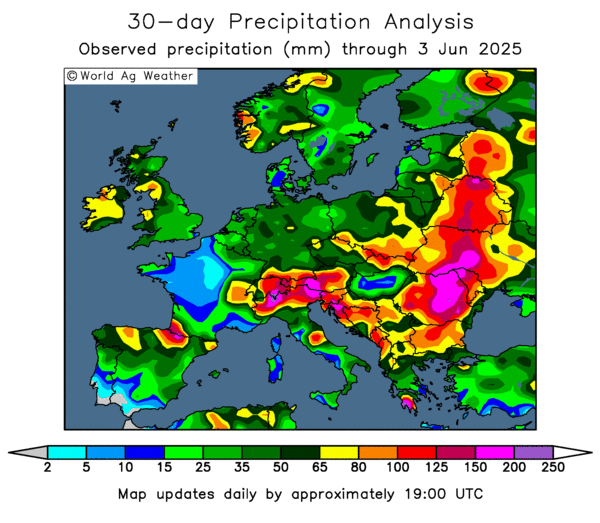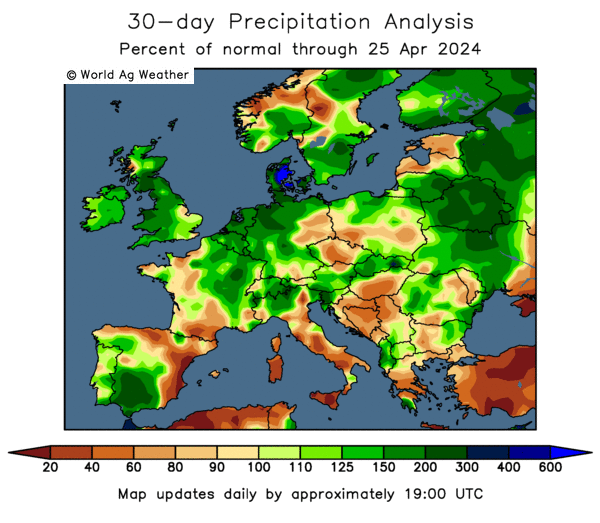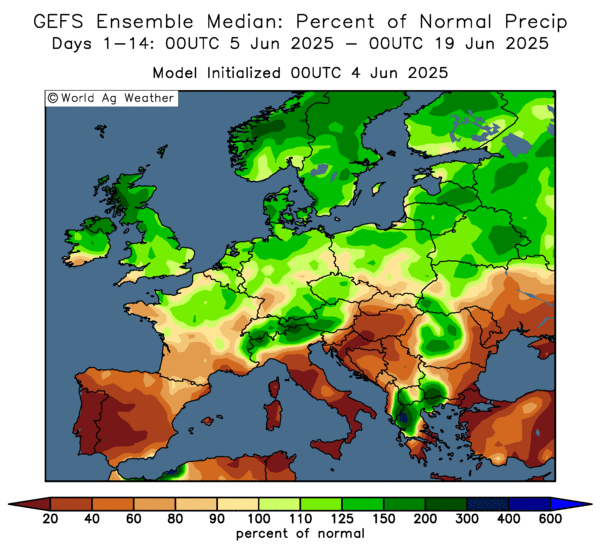EU Wheat Close
 18/01/11 -- Jan London wheat closed GBP1.00 higher at GBP190.60/tonne, with new crop Nov GBP2.60 higher at GBP169.10/tonne. Mar Paris wheat rose EUR4.00 to EUR255.75/tonne, whilst new crop Nov climbed EUR3.75 to EUR228.25/tonne.
18/01/11 -- Jan London wheat closed GBP1.00 higher at GBP190.60/tonne, with new crop Nov GBP2.60 higher at GBP169.10/tonne. Mar Paris wheat rose EUR4.00 to EUR255.75/tonne, whilst new crop Nov climbed EUR3.75 to EUR228.25/tonne.
The quality wheat traded in Paris continues to rebuild it's premium over that traded in London.
Ukraine has hinted that it may at least review it's existing export quota system - currently in place until the end of March - sometime next month. That doesn't help too much if you want wheat tomorrow mind.
If you do you can cross Argentina off your list as they are on strike. In addition Australia has logistical and quality problems of it's own.
That leaves either France or the US if it's quality bread-making wheat you're after, hardly what you would call a buyers market.
The Algerian government seem to have their buying boots on right now, keen to avoid the same fate as the recently toppled Tunisian ruler Zine al-Abidine Ben Ali. They are not alone amongst North African and Middle east nations fighting civil unrest over soaring food prices.
China's wheat production potential this year is still very uncertain following drought in the north. Meanwhile winter wheat in the top producing US state is also under threat from drought.
Global Crop Weather Highlights
 18/01/11 -- World agri-weather highlights from the excellent Martell Crop Projections:
18/01/11 -- World agri-weather highlights from the excellent Martell Crop Projections:
- Persistent northern US storm track increasing the snow pack; northern Midwest corn area insulated by deep snow; lucky considering the coming cold wave
- Top Brazil soy state Mato Grosso doing better with rainfall in January, soybeans are filling pods; favourable wet forecast in South Brazil soybeans Parana and Rio Grande do Sul
- Argentina grain belt will get some rain this week, but not enough for developing crops; cool night temps ideal for Buenos Aires crops holding down evaporation
- Northern Europe now in a drier weather pattern; excellent heavy rain last week reversed dry soil conditions; balmy temperatures will vanish this week forcing winter grains back into dormancy
- Better harvesting weather this week in Southern Australia wheat, mostly dry and sunny, low humidity, warm temperatures
- Feast or famine in China; persistently dry in North China Plain damaging winter wheat; too much rain in central-southern China rapeseed
- India weather unremarkable in dry winter monsoon; warm forecast not welcome in western areas that grow rapeseed
- Russia Black Sea wheat got spotty showers Sunday, not nearly enough to offset serious winter drought in Stavropol, Rostov, eastern Krasnodar; wheat dormant with a cold forecast ahead
- Ukraine winter crops will have plenty of field moisture come spring; winter has brought heavy snows; warming temps this week may cause ice crusts in southern Ukraine
Early Call On Chicago
 18/01/11 -- The overnight trade closed with wheat around 15c higher, corn up 4-6c and beans 3-6c lower.
18/01/11 -- The overnight trade closed with wheat around 15c higher, corn up 4-6c and beans 3-6c lower.
China may have cancelled a couple of soybean cargoes over the weekend due to negative crush margins, is one report doing the rounds which may explain beans performance this morning.
Even so, they will import 4.55 MMT of the buggers this month, up from a previous estimate of 3.35 MMT, according to their commerce ministry.
They only attracted buying interest for 174 TMT of corn in today's government auction apparently, less than 10% of what was on offer, and continuing with the recent trend.
Japan are shopping for their regular weekly wheat tender, looking for 149 TMT of US/Canadian wheat.
North Africa and Middle Eastern buyers are also in the market, with Algeria reported to have bought some 600,000 MT late last week, and rumoured to be still looking for more. They say that they are going to increase the amount of wheat that they sell at subsidised rates to local millers to help against food price inflation.
The market seems to think that the government there are caught between a rock and a hard place and may attempt to buy their way out of trouble. Booking large quantities of wheat, even at these levels, may be one way of doing it.
Of course they aren't the only African nation seeing such public reaction to the current situation, and others may also be forced into entering the market soon high prices or not.
Argentina got some rain over the weekend, but the soybean and corn crops there are far from out of the woods yet. Brazil is faring somewhat better, apart from the extreme south. AgRural upped their Brazilian soybean estimate to a record 69.7 MMT yesterday.
Argy farmers are on strike this week, disrupting grain supplies to the ports. It may only be a matter of time before dock workers decide to throw their tools down too if recent years are anything to go by.
Drought remains a problem for wheat in the top US producing state of Kansas. The accumulated moisture from October 1 to January 15 was only 2.51 inches - just 56% of normal - according to Martell Crop Projections.
The dollar is at or close to two month lows against both sterling and the euro. Concerns are mounting over the size of US government debt which has risen from USD7.6 trillion to USD14 trillion in the last five years.
Are we in for a period of prolonged dollar weakness? If so dollar-denominated commodities could go higher yet.
Early calls for this afternoon's CBOT session: Wheat up 13-15 cents, corn up 5-7, soybeans down 2-4.
EU Rapemeal Prices
 18/01/11 -- Latest guide prices for EU rapemeal.
18/01/11 -- Latest guide prices for EU rapemeal.
Basis FOB Lower Rhine in euros/metric tonne, with change from previous trading session:
| Jan11 | 233.00 | +1.00 |
| Feb/Apr11 | 233.00 | -1.00 |
| May/FH Jul11 | 233.00 | unch |
| Aug/Oct11 | 190.00 | -2.00 |
| Nov11/Jan12 | 195.00 | unch |
| Nov11/Apr12 | 196.00 | -1.00 |
UK Inflation Rises Again
 18/01/11 -- Figures just out reveal that UK inflation rose by much more than most expected last month, coming in at 3.7% - from 3.3% in November and getting on for double the Bank of England's target rate of 2%.
18/01/11 -- Figures just out reveal that UK inflation rose by much more than most expected last month, coming in at 3.7% - from 3.3% in November and getting on for double the Bank of England's target rate of 2%.
We probably WILL be double it once January's figures come out next month.
The car went in for a service & MOT yesterday, even though it wasn't due until the end of the month. The garage rang me twice in December to remind me to book it in. When it usually goes in, I'm struggling to find a parking space and have to simply stick it wherever I can, but not yesterday - there was acres of room.
It's normally in all day too, but not yesterday, despite needing a few tweaks here and there. I took the dog with me and walked him back and they were on the blower almost as soon as I'd walked in the door.
The guy in the courtesy car they sent to collect me said he'd never known things so quiet, people just haven't got the spare cash he opined. As we drove on we went past the local petrol station selling diesel at 131.9p/litre - the one generally accepted as being the cheapest in the area. That's only 1p cheaper than the most I recall it ever being at the height of the USD147/barrel oil price boom in 2008.
I decided to go for a quick pint in the afternoon - there was after all no Chicago to distract me. So I popped into Knaresborough for a beer with my old chum Mr H. Lucky old Mr H took early retirement and can usually be found in one of two hostelries in the town around 2pm. I haven't been over to see him for about a fortnight, with all the snow & everything. Bugger me, a pint of Becks Vier has gone up 20p since then.
Interest rates may be going up sooner rather than later is what the market is starting to think, as the price of everything moves up all around us on an almost daily basis it now seems.
The pound is up above 1.60 against the dollar for the first time in almost two months this morning on the back of this latest news. It only stayed there briefly then, the last time were were above that level for any length of time was in late 2009.
Is this an opportunity or a change of fortunes?
EU Wheat Close
 17/01/11 -- EU wheat futures closed mixed Monday, with nothing in the way of fresh impetus from a closed US market.
17/01/11 -- EU wheat futures closed mixed Monday, with nothing in the way of fresh impetus from a closed US market.
London wheat finished sharply lower with Jan down GBP3.75 to GBP189.60/tonne and Nov falling by GBP1.00 to GBP166.50/tonne. Paris wheat saw Mar up EUR1.25 at EUR257.75/tonne and Nov EUR1.75 higher at EUR227.75/tonne.
It's been twenty sessions since front month London wheat closed below GBP190.00/tonne, falling today on a firmer pound and concerns over demand for feed wheat from an ailing livestock sector.
Paris milling wheat rose on reports that Algeria was again back in the market buying wheat over the weekend, despite soaring prices, in an effort to quell continued unrest over soaring food prices in the North African nation.
A weak euro also helped Paris wheat push firmer.
Countries like Algeria and Tunisia seem to be willing to buy almost any wheat they can get their hands on at the moment, with reports today suggesting that the former bought more than half a million tonnes on Friday.
Whilst Argentina and Australia are expected to flex their export muscles over the coming months, the formers growers have just begun a one week strike, whilst flooding and quality concerns in the latter may also impact upon their shipments to foreign destinations.
Meanwhile if you are a desperate North African buyer faced with civil unrest and a military coup, then buying wheat on your relative doorstep from a reliable supplier like France looks an attractive proposition.
Ukraine Crop Conditions
 17/01/11 -- The Ukraine Ministry report significantly better crop conditions than twelve months ago, particularly for rapeseed.
17/01/11 -- The Ukraine Ministry report significantly better crop conditions than twelve months ago, particularly for rapeseed.
As of the end of last week winter rapeseed was rated 54% in good condition (compared to only 39% a year ago), with a further 38% rated satisfactory (from 40%) and only 8% weak/thinned (from 21%).
Despite a fall in planted area, Ukraine's rapeseed crop could rebound close to 2 MMT this year if weather conditions play ball, according to UkrAgroConsult. A very hard 2009/10 winter saw high levels of abandonment last season, whereas so far in 2010/11 weather conditions have been relatively benign.
Other crops are also showing significant improvement on last year. Winter wheat is rated 57% good (from 46% last season), 36% satisfactory (44%) and 6% weak/thinned (10%).
Winter barley is rated 47% good (42%), 45% satisfactory (47%) and 9% weak/thinned (12%).
Note: any slight discrepancies are due to rounding.
German Dioxin Scandal Grows
 17/01/11 -- The German dioxin in feed contamination saga is turning into a "scandal within a scandal" said Agriculture minister Ilse Aigner after almost a thousand more farms were closed over the weekend, according to this report from the BBC.
17/01/11 -- The German dioxin in feed contamination saga is turning into a "scandal within a scandal" said Agriculture minister Ilse Aigner after almost a thousand more farms were closed over the weekend, according to this report from the BBC.
The short-term effects of this are not good. German pork, eggs and chicken consumption has plummeted following the outbreak of the news, and slaughterings are likely to increase further after this latest development.
"German pig producers have seen their prices fall by more than £28 a pig. The dioxin scare has also had a knock-on effect on British cull sow prices, which have fallen 10p a kilo in the last few days," according to Pig World.
The dioxin scare is the latest kick in the nuts for many pig producers who, faced with soaring feed prices simply don't have the time to sit and wait for pig prices to recover.
Meanwhile this may be the last straw for pig producers on the continent, who are exiting the industry "left, right and centre" according to my pig nutritionist mate Phil Baynes, faced with the impending added expense sow stall ban on Jan 1st 2013.
That may be good news for British producers in it for the long-haul, but there looks like being a bit more pain to endure first.
Meanwhile, the implications for feed demand within the EU are there for all to see. The National Pig Association forecast EU pigment production to decline by almost 900,000 MT this year, and more more than a million tonnes each in 2012 and 2013.


















